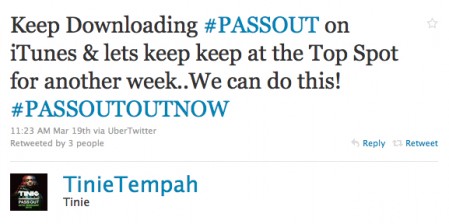Record companies, large and small, invest around US$5 billion a year in music talent, support a global roster of thousands of artists and typically spend US$1 million to break successful pop acts in major markets.
The figures are published in a new report issued today highlighting the work of major and independent record companies as the principal investors in artists’ careers. Advances, recording, marketing and promotional costs are the biggest items of record company spending on artists, commonly totalling six figure sums.
There are more than 4,000 artists on major record companies’ rosters combined, and many thousands more on independent labels. There is continuous re-investment of revenues derived from successful acts into new talent. It is estimated that one in four artists on record companies’ rosters were signed in the last 12 months.
Record companies are the largest investors in music talent, ploughing around 30% of their sales revenues - around US$5 billion worldwide - into developing and marketing artists. This includes an estimated 16% of sales revenues that is spent on artist and repertoire work (A&R), a proportion that significantly exceeds the proportionate research and development (R&D) expenditure of virtually all other industries. In addition, labels pay significant sums in royalties to featured performers.
Recorded music has a massive economic “ripple effect”, helping generate a broader music sector, including live music, radio, publishing and audio equipment, estimated to be worth US$160 billion annually. IFPI estimates that more than two million people are employed globally in this broader music economy.
“Investing in Music” report
Investing in Music is published today by IFPI, representing the recording industry worldwide, in collaboration with WIN, the international network of independent record labels. The report provides new figures and outlines the special skills and services companies provide in developing and promoting artists.
Alison Wenham, Chair of AIM/WIN, says: “The direct route afforded by the internet is open to all. However, mixing the talents of business and creativity is often a minefield, with creativity often compromised by the challenges of running a business, which requires totally different skills. Artists generally prefer to leave the complex administration of a rights based business to someone else.”
The report uses data from IFPI’s member record companies and case studies from around the world, including David Guetta, Kasabian, Little Boots, Jason Mraz, Belanova, Mousse T and Stephane Pompougnac. Highlights include:
* A&R combines internet technology and traditional scouting skills, playing a critical role in bringing artists to a wide audience. Labels help their artists cut through the digital noise, with more than 2.5 million hip hop and 1.8 million rock acts registered on MySpace alone.
* Record labels invest increasingly through “broad rights” deals across different activities of an artist’s work, including live and merchandising and branding. Multi-album deals are often important in allowing a return on this substantial investment. In many cases, artists and record labels enjoy long term partnerships.
* The work in the studio to record the album and select the singles remains a very significant investment and area of collaboration.
* The marketing skills and resources of record companies, from video production to online promotion, are essential in bringing artists to a mass audience. An international marketing “war machine” helps artists develop into global stars.
* Despite the success of the live music sector in recent years, recorded music remains the foundation for a successful artist career.
John Kennedy, chairman and chief executive of IFPI, says: “Investing in music is the core mission of record companies. No other party can lay claim to a comparable role in the music sector. No other party comes close to the levels of investment committed by record companies to developing, nurturing and promoting talent.
“One of the biggest myths about the music industry in the digital age is that artists no longer need record labels. It is simply wrong. The investment, partnership and support that help build artist careers have never been more important than they are today. This report aims to explain why. Investing in Music is about how the music business works. It explains the value that music companies add, helping artists to realise a talent that would typically go unrecognised and get to an audience they would otherwise not reach.
“Much of the value added by music companies is invisible to the outside world. Yet it is the investment and advice from labels that enable an artist to build a career in music and which, in turn, creates a beneficial ripple effect throughout the wider music sector.”
High levels of investment
It is estimated that the recorded music industry spends around 30% of its total revenues - around US$5 billion a year - discovering, developing and promoting talent. Of that, a global average of 16% is spent on A&R, with a higher than average level in certain countries such as the UK (where A&R investment totalled 23% in 2007).
Global music industry investment in A&R is considerably higher than similar investments in other industries. In the UK, the pharmaceutical and biotechnology industry, widely acknowledged as a leader in research and development, invests 15% of its gross revenues in R&D (BIS R&D Scoreboard, 2008).
A&R spending today, however, is under greater pressure than ever from the impact of illegal file-sharing and other forms of piracy. In France, industry data shows record companies invested 12% of their turnover in marketing artists in 2009, a proportion that fell from 15% in 2006, at a time of reduced revenues which have been largely attributed to illegal file-sharing.
How the investment breaks down
Investing in Music outlines the very substantial investments involved in developing and marketing successful artists. In the UK and US, it is estimated that it typically costs more than US$1 million to break a pop artist. This is spread across an advance paid to the artist, recording costs, video production, tour support and promotional work. A typical example of the breakdown of the costs of breaking a new pop act in major markets is as below:
Advance US$200,000
Recording US$200,000
3 videos US$200,000
Tour support US$100,000
Promotion/marketing US$300,000
TOTAL US$1,000,000
* Payment of an advance to the artist. Such an advance allows an artist to give up their day job and concentrate on writing, rehearsing, recording and performing music. Advances are recoupable from an artist’s sales, but are not recouped if those sales do not reach certain levels, leaving the record company bearing the risk of investment. A typical advance paid to a new pop act in major markets is US$200,000, but often will be higher. Advances for an established “superstar” act will commonly be in excess of US$1 million.
* Financing of recording costs. Costs could be over US$200,000 for a new artist to record an album, though employing a top producer can drive this above US$50,000 per track. Hiring large numbers of session musicians or an orchestra can also drive up the budget. In this way, investment in recordings benefits a wide community of musicians and technicians.
* Production of videos. Video costs can also range widely. Some of the most expensive ever produced involved days of filming and editing, costing around $1 million. A typical cost for filming videos to promote a new artist’s album is around US$200,000.
* Tour support. New artists in particular need to be heavily supported by record companies. The level of tour support required is highly dependent on the nature of the artist. Tour support would typically cost around US$100,000 for a new artist in one market.
* Marketing and promotion. These are often the biggest budget items for a record label taking an act to the public. Labels invest heavily in marketing and promoting artists to a broad audience. Such promotion builds the brand identity from which artists can then earn money from numerous sources, such as live touring or merchandise. A typical investment in marketing and promoting a new act is US$300,000.
* Royalty payments. Payment of royalties is usually based on a percentage of revenues, licensed or synchronised income revenue streams. Teams in music companies are responsible for collecting and distributing royalties to the featured performers, producers and copyright owners.
The virtuous “circle of investment”
Recording contracts typically commit artists and labels to work together to produce a series of albums. Artists benefit from heavy upfront investment that would be difficult to secure elsewhere and record labels have the opportunity to recoup their outlay over a period of time.
Achieving commercial hits is the basis of the “circle of investment”, by which music companies plough back the revenues generated by successful campaigns to develop new talent and help fund the next generation of artists.
Continually investing in new talent is a hugely risky business, as only a minority of the artists developed by music companies will be commercially successful in a highly competitive market. Estimates on the commercial success ratio of artists vary between one in five and one in ten.
The level of investment in new artists required remains high, despite the development of new distribution channels for recorded music. In fact, the fragmentation of music distribution across many different physical and digital channels has often brought extra costs to record companies that are now working with many more retail partners.
* US$5 billion a year invested in artists by record companies worldwide
* Around 30% of revenues spent on artist development and marketing
* US$1 million to break a new artist in major markets
* US$160 billion “broader” sector employing two million people
via musicindustryreport.org










